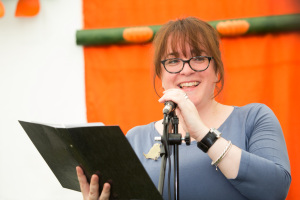Last week, I was on leave from The Poetry School. I work here for three days a week, but the other 40% of my working life is filled with freelance projects. Of those freelance projects, most are run through my own company, Jaybird Live Literature, which specialises in putting poets on stage in – to quote my own blurb back at myself – a ‘subtly theatricalised’ fashion. I slot my own writing and related activities into the time that’s left. Is it possible to make a living from poetry? I manage to make a living in poetry, but the proportion of my annual income which comes directly from my writing and not my arts admin work is usually about 4%.
That said, last week’s bustle was mostly writing related, and it was an extraordinary week. I am prone to Freelancer’s Fear (What if I never get another contract? What if all the bills turn red at once?) so try not to turn a job down, even if it means using holiday from one job to work for another. Is it a hard life, toiling down the poetry mine? No, of course not – I love my work, and am grateful for and continually inspired by it.
Last week, I spent mostly at Guy’s Cancer Centre in London Bridge, making origami pigeons. Over 1,700 of them altogether, created with the patients, staff and visitors to the new centre which has an arts programme to rival that of any library or community centre. The idea of mass collective origami was inspired by the story of Sadako Sasaki, the little girl caught up in the Hiroshima fallout who wanted to fold 1,000 paper cranes and make a wish before she died, age 12, of radiation-related leukaemia. We made pigeons because they are messenger birds, and ours contained brief poetic messages of hope and support – the wishes and prayers you want to make when you or your friends are being treated for cancer. Also, we’re Londoners. The pigeon is our municipal familiar. The conversations which the 2 minute pigeon-making process elicited were astonishing. One pigeon read ‘My best hospital visit ever’, another ‘I hope my life was worth saving’. The amount of life experience I absorbed in a week is going to take a long time to process, and I haven’t worked out if I’ll do so as a poet yet. I’m not sure if those stories are mine to use.
More easily assimilated was the work in between the pigeons: the Skype chat with the illustrator of my forthcoming Emma Press pamphlet, the high-powered business meeting* with the director of the possible next Jaybird show, a bit of prep for next month’s digital poetry residency for a Nottinghamshire festival, and some work on a live-literature-in-East-Anglian-pubs project I’m assisting on. And the Poetry School’s own Mixed Borders. My mini-residency was in the Dean of Southwark Cathedral’s garden. It’s been hard to get into the area because of the Borough Market attack lockdown. Back and forwards all week between cancer wards and police cordons – by the weekend, all I wanted to do was sit by the pond in the Deanery garden and read poems to people in the sun.
As a writer and an employer of writers, I think hard about the value of creative work, and how it’s rewarded. That poetry is hard to monetise is becoming more important for me: I want to value it in places other than my bank account. 4% is fine. The connections I’ve made this week through poetry are not to do with making a living. They’re to do with living.
(* pizza)

Julia Bird grew up in Gloucestershire and now lives in London where she works as the Creative Director for The Poetry School and as an independent live literature producer. She published two collections with Salt (Hannah and the Monk, 2008, and Twenty-four Seven Blossom, 2013) and has an illustrated pamphlet (Now You Can Look) coming out with The Emma Press in the Autumn.
Add your Reply
You must be logged in to post a comment.